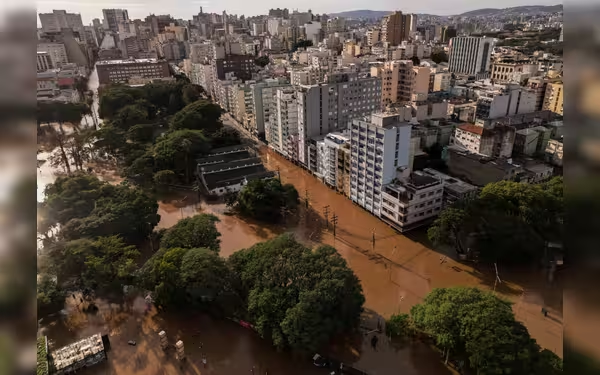Thursday, July 4, 2024 06:42 PM
Climate Change Impact on Global Flooding
- Rising temperatures intensify rainfall events
- Human-induced climate change linked to heavy precipitation
- Importance of proactive measures in climate resilience
 Image Credits: arabnewspk
Image Credits: arabnewspkThe impact of climate change on global flooding, from rising temperatures intensifying rainfall to the importance of proactive measures for climate resilience.
Flooding has become a significant issue impacting countries worldwide, including Kenya, Dubai, Russia, China, Brazil, and Somalia. While not all instances can be directly attributed to global warming, the occurrence of these floods during a year of record-high temperatures underscores the influence of climate change on extreme weather events.
Climate change extends beyond just rising temperatures. The excess heat trapped in the atmosphere and oceans has far-reaching effects. Recent months have seen consecutive record-breaking heat levels, with ocean temperatures also hitting unprecedented highs.
One of the consequences of warmer oceans is increased evaporation, coupled with the atmosphere's ability to hold more water vapor due to higher temperatures. This leads to more intense rainfall events. For every one-degree Celsius increase in temperature, the atmosphere can hold seven percent more moisture, contributing to heavier rainfall.
While some regions face extreme rainfall and floods, others endure severe heatwaves and droughts as a result of a warmer atmosphere redistributing moisture. Natural climate variability, including phenomena like El Nino, also plays a role in global weather patterns.
Scientific studies have identified human-induced climate change as a significant factor in the long-term increase in heavy precipitation globally. Although attributing individual floods solely to climate change is complex, comparisons against simulations considering a world without global warming provide insights.
Rapid assessment networks have linked recent extreme weather events, such as floods in the UAE, Oman, China, and Brazil, to the impacts of global warming. While distinguishing natural variability from global warming poses challenges, the influence of climate change on severe weather events is becoming increasingly apparent.
Many countries currently grappling with heavy floods, such as Burundi, Afghanistan, and Somalia, are among the most vulnerable and least prepared to handle such disasters. The importance of proactive measures in preparing for weather extremes is emphasized, as acting early is more cost-effective than responding after the fact.
As we witness the devastating effects of flooding in various parts of the world, it becomes clear that climate change plays a significant role in exacerbating these events. From rising temperatures to increased rainfall intensity, the consequences of a warming planet are evident. It is crucial for countries to prioritize climate resilience and adaptation strategies to mitigate the impacts of extreme weather events. By raising awareness and taking proactive steps, we can work towards a more sustainable future for all.













